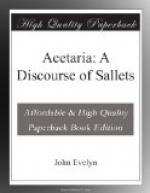[Footnote 39: [Greek: hora to rhadios phaines], quia tertio a fatu die appareat.]
[Footnote 40: De diaeta lib. ii. cap. 25.]
[Footnote 41: De Aliment. Facult. lib. ii.]
[Footnote 42: Philos. Transact. Vol. xvii. Num. 205. p. 970.]
[Footnote 43: Plin. H. Nat. Lib. xix. cap. 3. & xx. c. 22. See Jo. Tzetzes Chil. vi. 48. & xvii. 119.]
[Footnote 44: Spanheim, De usu & Praest. Numis. Dissert. 4to. It was sometimes also the Reverse of Jupiter Hammon.]
[Footnote 45:
[Greek: oud an eidoies ge moi]
[Greek: Ton plouton auton k- to Bat-ou
silphion].
Aristoph. in Pluto. Act. iv.
Sc. 3.]
[Footnote 46: Of which some would have it a courser sort inamoeni odoris, as the same Comedian names it in his Equites, p. 239. and 240. Edit. Basil. See likewise this discuss’d, together with its Properties, most copiously, in Jo. Budaeus a Stapul. Comment. in Theophrast. lib. vi. cap. 1. and Bauhin. Hist. Plant. lib. xxvii. cap. 53.]
[Footnote 47: Vide Cardanum de usu Cibi.]
[Footnote 48: Vol. xx.]
[Footnote 49: Cowley:
[Greek: Oud oson in malache te k-
asphodelo meg oneiar]
[Greek: Krupsantes gar echousi theoi
Bion anthropoisi.]
Hesiod.]
[Footnote 50: Concerning this of Insects, See Mr. Ray’s Hist. Plant. li. l. cap. 24.]
[Footnote 51: The poyson’d Weeds: I have seen a Man, who was so poyson’d with it, that the Skin peel’d off his Face, and yet he never touch’d it, only looked on it as he pass’d by. Mr. Stafford, Philos. Transact. Vol. III. Num. xl. p. 794.]
[Footnote 52: Cowley, Garden, Miscel. Stanz. 8.]
[Footnote 53: Sapores minime Consentientes [Greek: kai sumpleko-uas ouchi symphonous haphas]: Haec despicere ingeniosi est artificis: Neither did the Artist mingle his Provisions without extraordinary Study and Consideration: [Greek: Alla mixas panta kata symphonian]. Horum singulis seorsum assumptis, tu expedito: Sic ego tanquam Oraculo jubeo.——Itaque literarum ignarum Coquum, tu cum videris, & qui Democriti scripta omnia non perlegerit, vel potius, impromptu non habeat, eum deride ut futilem: Ac ilium Mercede conducito, qui Epicuri Canonen usu plane didicerit, _&c. as it follows in the_ Gastronomia of Archestratus, Athen. lib. xxiii. Such another Bragadoccio Cook Horace describes
Nec sibi Coenarum quivis temere arroget
artem
Non prius exacta tenui ratione saporem.
Sat. lib. ii. Sat. 4.]
[Footnote 54: Milton’s Paradise Lost.]
[Footnote 55:
—— Qui
Tingat olus siccum muria vaser in calice
empta
Ipse sacrum irrorans piper ——
Pers. Sat. vi.]




